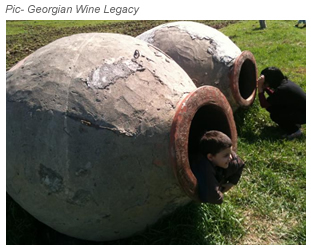|  Qvevri wine-making takes its name from the distinctive egg-shaped clay vessel which has generally about 800-2000 liter capacity. Wine is fermented and stored in these earthen vessels in villages and towns throughout Georgia. The tradition plays a vital role in everyday life and celebrations, and forms an inseparable part of the cultural identity of Georgian communities, with wine and vines frequently evoked in Georgian oral traditions and songs. Knowledge of this heritage is passed down by families, neighbours and friends, all of whom join in the communal harvesting and wine-making activities, says a report by Hvino News, a news agency in the Republic of Georgia. Qvevri wine-making takes its name from the distinctive egg-shaped clay vessel which has generally about 800-2000 liter capacity. Wine is fermented and stored in these earthen vessels in villages and towns throughout Georgia. The tradition plays a vital role in everyday life and celebrations, and forms an inseparable part of the cultural identity of Georgian communities, with wine and vines frequently evoked in Georgian oral traditions and songs. Knowledge of this heritage is passed down by families, neighbours and friends, all of whom join in the communal harvesting and wine-making activities, says a report by Hvino News, a news agency in the Republic of Georgia.
According the Report, The UNESCO committee considered the following criteria while awarding this cultural heritage that allows it to be included in the Representative List of the Intangible Cultural Heritage of Humanity:
1. The knowledge and skills associated with making both wine and the Qvevri jars are widely practiced and transmitted informally from generation to generation; they are ingrained in the everyday life of Georgians and maintain social and religious significance
2. Its inscription on the Representative List could contribute to promoting awareness of the intangible cultural heritage through attention to traditional wine-making practices and associated skills and rituals
3. Past, current and proposed safeguarding measures focus on the improvement of legal frameworks, promotion, transmission, and education; the commitment of the communities and the support of the State Party are clearly demonstrated
4. Communities, non-governmental organizations and local authorities participated actively in the nomination process and the communities provided their free, prior and informed consent
The process and the plea for this method to be given the Recognition, was initiated in March 2012 and several wine producers, associations, wine clubs, villages and different forums had signed the petition, which was followed by lobbying. Georgian Foreign Minister Maia Panjikidze said last month visiting UNESCO Headquarters in Paris, ostensibly to lobby for the inclusion of this cultural aspect of wine making exclusive to Georgia. "We want the tradition of making of the Georgian wine, which is called qvevri wine to be included into UNESCO's List of Intangible Cultural Heritage this year," she had said.
UNESCO points out that the Representative List of the Intangible Cultural Heritage of Humanity serves to raise awareness of intangible heritage and provide recognition to communities’ traditions and know-how that reflect their cultural diversity. However, the List does not attribute or recognize any standard of excellence or exclusivity.
The Intangible Cultural Heritage programme was established in 2008, when the Convention for the Safeguarding of Intangible Cultural Heritage took effect. Georgia joined UNESCO Convention for the "Safeguarding of Intangible Cultural Heritage" in 2007. The Georgian folklore has already been included in the list of the world's intangible cultural heritages.
For a video on this winemaking technique, visit here
For the countries interested in knowing about the application process , click here for the Application in MS Word. The consent letters from Georgian organizations related to Qvevri, can be viewed in the PDF format here
Georgian wines have been gaining popularity in the world for the last few years especially the wines made from Saperavi and Rkatsiteli grapes. They are also available in India through Gurgaon-based Tabuni Wines. For details, contact pkbali@gmail.com or kartiksharma@tabuniwines.com. For more information on Georgian wines, you may visit http://georgianwine.org/
Subhash Arora
Tags: Qvevri, UNESCO's List of Intangible Cultural Heritage, UNESCO, Georgia, Georgian wines |